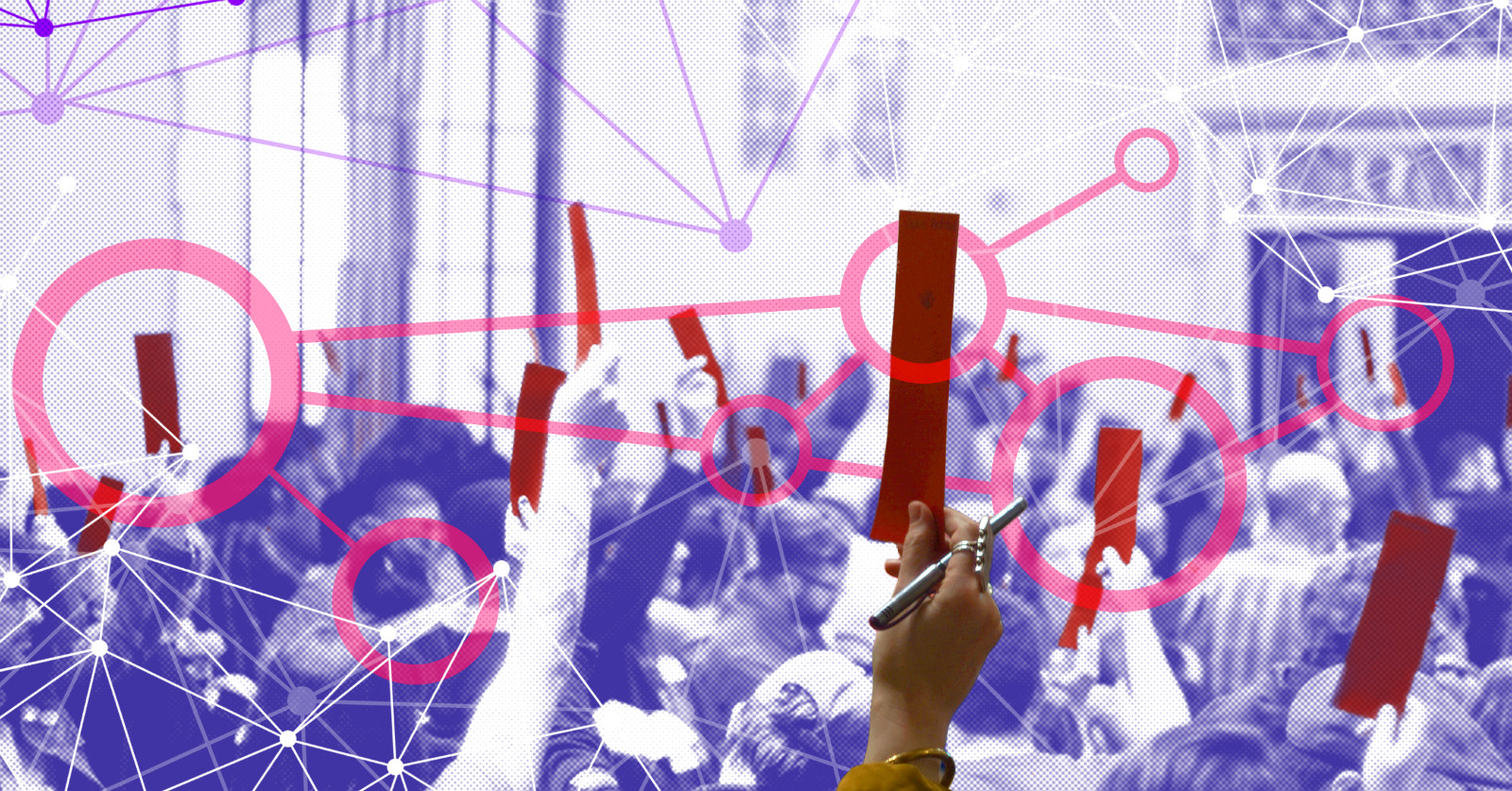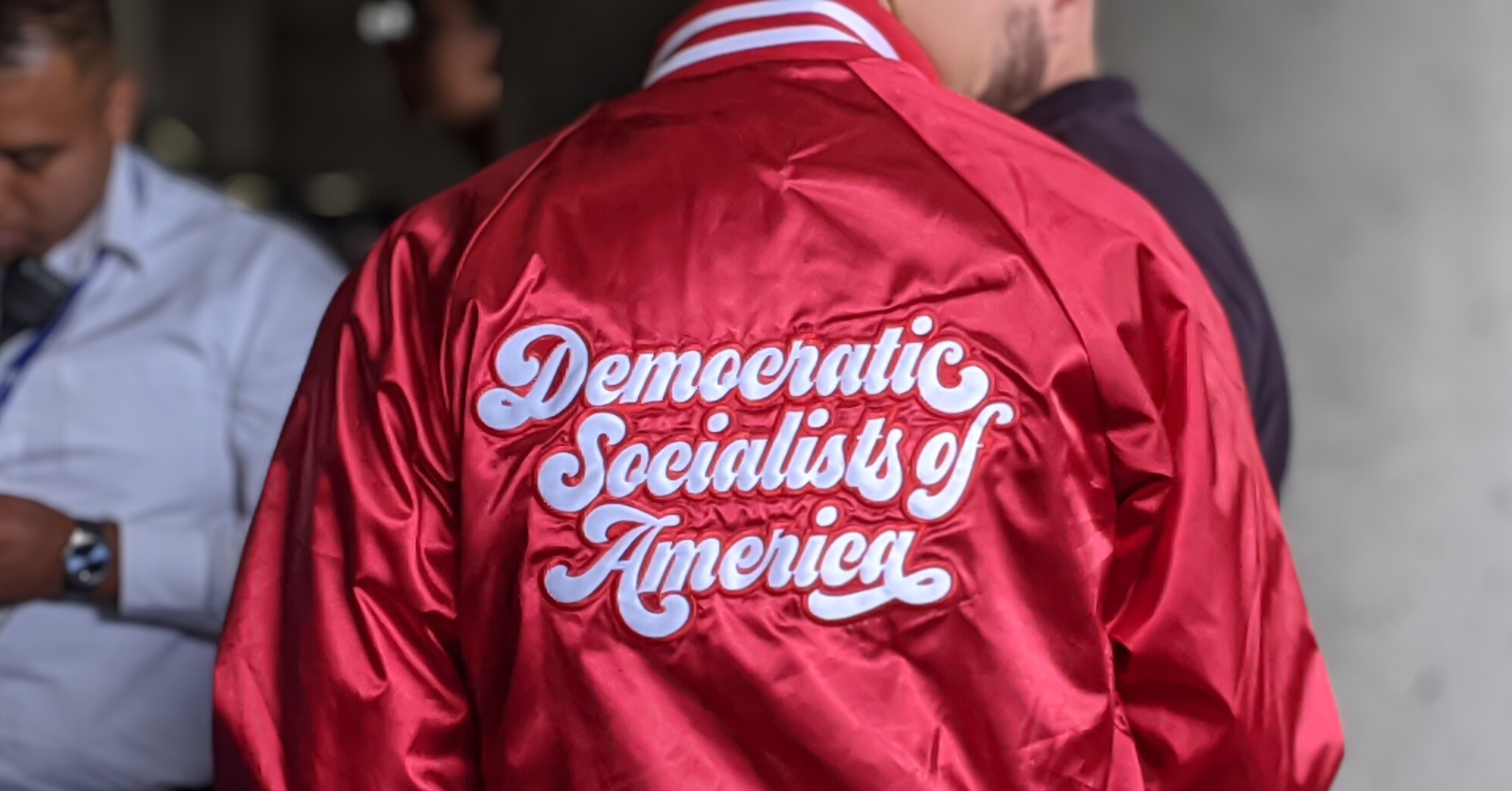DSA conventions are held every two years and serve as the highest decision-making body for our democratic organization, as well as a place for activists and organizers to meet, make connections, and learn from one another. This weekend, DSA’s National Political Committee will discuss two proposals about the format and content of DSA’s 2023 convention. One proposal, put forward by the Disability Working Group, calls for a hybrid convention where delegates can participate either virtually or in-person. This idea is already the subject of debate online, with concerns about accessibility, the quality of democratic decision-making, and convention logistics at the forefront.
We believe the overwhelming success of YDSA’s July 2022 convention shows that not only is it possible to hold an in-person convention that’s broadly accessible and safe for members (including one of the authors of this article, who is severely immunocompromised), a fully in-person convention is also necessary for the democratic decision-making that underpins our prospects for developing a winning strategy to change the world.
There are several questions that arose from the YDSA convention around the problem of accessibility in DSA and YDSA that we want to address. To start, we want to illustrate what accessibility actually looks like, reinforce the argument against Amendment 1, “A Voice for Disability,” and discuss why we believe the in-person format, particularly the one on display at the YDSA convention and YDSA’s winter conference earlier in the year, allowed for this level of debate, and should be a model for safe and inclusive events.
Convening in Person Strengthened YDSA
This year’s YDSA convention took place July 22-24 in Minneapolis. Over these three days, more than 100 delegates representing over 50 YDSA chapters from across the country, including the authors of this article, met to deliberate over resolutions and YDSA constitutional amendments. Masks were required at all times including debate, socials, and when not actively eating during meals. All attendees were required to submit proof of up-to-date vaccination status (at least 3 shots) and a negative covid test before traveling. These rules were strictly enforced by staff who monitored compliance throughout the weekend.
Because of these safety provisions, delegates participated in over twelve hours of political deliberation, holding some of the most rigorous, substantive, and comradely debate YDSA has ever seen and addressed a range of our most pressing questions.
This is notably different from the 2021 virtual DSA convention, where there was little substantive political debate and instead delegates were subjected to hours of procedural motions and delays. And because delegates were glued to their devices instead of sitting in a room next to their comrades, many engaged in distracting and sometimes vicious live-tweeting and side debate on Twitter or Slack.
YDSA’s Amendment 1
Though it failed, Amendment 1 was one of the most important debates of the entire YDSA convention. The amendment would have required at least one member of the NCC to self-identify as disabled. The debate for this amendment, though not as long as many other debates, was among the most emotional and difficult of the entire convention. Delegates supporting the measure pointed out that myriad structural factors can prevent disabled people from seeking and winning political positions in YDSA. They argued that a quota would solve this issue similarly to previous attempts to address racial and gender inequities through quotas.
The opposing position, argued for by a number of disabled comrades, acknowledged the difficulties faced when seeking leadership, but found the amendment inadequate to address the actual issue. The reason that it is often difficult for disabled members to achieve elected positions in YDSA is not because their comrades distrust or disapprove of them. It’s that the everyday life of disabled people creates hurdles to participation (costly prescriptions, frequent doctors’ visits, etc.). Therefore, it was argued that initiatives like stipends for NCC members, as proposed in Resolution 4, would do more to actually meet material needs and empower disabled members to run for leadership. A stipend might mean that a disabled NCC member could drop a second job and still support themselves, creating more time for organizing. YDSA members and leaders are often overburdened as it is with attending school, working part-time, and running a campus organization, to say nothing of the emotional and social challenges of navigating leadership in the organization.
Amendment 1 simply did not do anything to make YDSA more accessible, beyond setting a quota for a position on the NCC publicly held by a disabled person. However, the authors did correctly diagnose structural barriers for disabled and other oppressed groups. To get more disabled, non-white, female, and gender-nonconforming members in leadership positions requires a two-pronged structural and organizational approach.
Leadership of all kinds, but particularly national leadership, must be cultivated, and doesn’t just occur spontaneously among members. Intentional leadership development is among the most important roles of current leaders at any level of the organization and it is the best way DSA and YDSA can get more diverse leaders.
Rather than quotas, some YDSAers proposed a targeted leadership development program focused on YDSA members from marginalized identities, especially disabled comrades. This program would exhibit a much more active approach to solving issues of diversity within the organization, and would do far more to ensure that YDSA has a wealth of skilled organizers from all backgrounds capable of taking on leadership roles.
Accessibility to Leadership Development
While collective decision-making is the most important task at a convention and the lifeblood of any democratic organization, YDSA and DSA conventions are about much more than just voting. They create important leadership development opportunities in ways that are simply impossible to mimic online. From formal plenaries and workshops, to social events at night, to casually mixing and meeting in lines for coffee and elevators, conventions offer established and newer socialist leaders so many opportunities to meet people doing the work in different contexts around the country, and from different perspectives in our big tent. These meetings develop organizing relationships, help us bridge differences, and strengthen the social bonds without which a voluntary organization simply cannot survive.
It is possible to have social events at an online or hybrid convention, but the connections people make during these events are not going to be as impactful and remote delegates will be left out. This is why it is so important that the focus of accessibility be on organizing our way towards an in-person convention that is as inclusive and safe as possible for delegates from diverse backgrounds.
A hybrid convention would not only take away from the important social and leadership development aspects of convention, it would limit the functioning of our organization’s democracy by institutionalizing unequal levels of participation, undermining equality in the name of inclusiveness. Conventions are much more than just voting on a series of resolutions; they are about participating in debate and building consensus.
Downtime at convention is often spent exchanging opinions with other delegates, which is crucial in order to level the playing field for the discussions that undergird the democratic processes. We cannot underestimate the power of a 1-on-1 conversation to change the way a comrade thinks about a vote. In-person conventions create the space for these events, at meals and in 5-15 minute breaks. While advocates of hybrid argue that similar conversations will occur over Slack or Zoom for remote participants, we’ve learned from the 2021 DSA convention and two years of the Covid 19 pandemic that these are imperfect and often unpleasant substitutes for in-person discussion. Experience shows that in a hybrid format, remote delegates would not be able to contribute on the same level as their peers on the convention floor, effectively disempowering the members they were elected to represent.
Lessons for DSA
The takeaways from YDSA’s convention success should be clear. By bringing organizers together in real-life space, we grant each other the grace necessary to carry out debate that is intense, sophisticated, and productive, all while ensuring respect and comradeship. Accessible conventions are created by empowering delegates to attend, and leadership positions open up to all members when their financial and accessibility needs are supported by the organization.
Generous funding for delegates can ensure that no comrade is turned away from participation because of economic issues. Strict vaccination and testing requirements can ensure that the convention is as safe as possible for immunocompromised members. We can also devise the convention rules to encourage delegates from marginalized identities and disabled DSAers to speak from the floor through progressive stack. Together, these measures offer a better alternative than a hybrid option that would institutionalize two unequal levels of participation in our democratic process.




